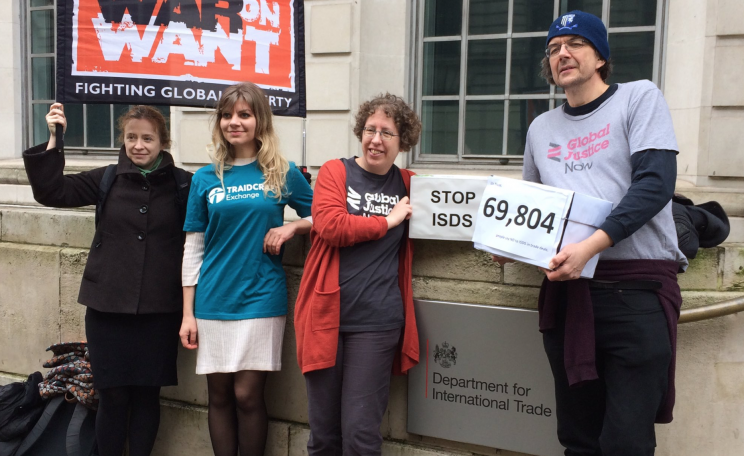Badnell's Pit, in Maidenhead, Berkshire, was a gravel quarry up until the late 1940s and for thirty years after was used as an unlicensed dump for industrial waste.
Today it is slated to be the site of a new development of 400 homes, despite being classified by the Borough Council as 'toxic'.
Asbestos is present on the site, and a soil analysis suggests 40 per cent of the dump is hazardous and carcinogenic. Helen Hyman lives near the development and has been involved in the residents' action group.
'They've been trying to build on that site for thirty years and every time it's been turned down. In a public enquiry in the late nineties the inspector said homes should never be built on that site. But now they've got permission and we're all very worried about what will happen when they open up that pit.
'We would take legal action but it all costs money and we don't have it,' she says.
Access to justice
The story, according to the Environmental Law Foundation (ELF), is a common one.
Their Access to Justice report, launched at the House of Lords in January, says that when it comes to decisions affecting the local environment, those with less money routinely lose out to those with more.
Nearly two thirds of cases included in the report were ultimately halted because the people pursuing legal action could no longer afford to do so.
'For ordinary people, when considering the implications of such potential costs, they may have to think in terms of risking the loss of their home. You can clearly see how for many, access to justice is denied by the system as it currently stands,' says Emma Montlake, legal and policy officer at ELF.
NGO obstacles
And it is not just individuals who are facing obstructions to justice.
Recently, the Marine Conservation Society (MCS) was unable to mount a legal challenge based on allegations of toxic waste dumping near the Port of Tyne, Newcastle, because of fears over the potentially crippling costs of losing the case.
Thomas Bell, a coastal pollution officer with the MCS, said: 'There is a real danger that toxic substances could be set free into the surrounding sea and poison the marine environment, but no full environmental impact assessment (EIA) has ever been carried out.
'It is not unreasonable to request a full EIA. However, the English legal system has not allowed us to bring a legal challenge.'
Environmental law firm ClientEarth, which was helping the MCS with the case, said the financial risk of losing a court challenge and having to pay the opposition’s legal expenses could amount to hundreds of thousands of pounds.
'Until the UK makes the legal system accessible and fair from a financial perspective, citizens and many organisations are in effect denied their right to raise legitimate environmental concerns in court,' said ClientEarth CEO James Thornton.
Aarhus Convention
However, there are rules in place at a European level that should be preventing this situation.
The Aarhus Convention, ratified by the UK in 2005, says prohibitive costs should not prevent people seeking access to justice.
Lawyers from ClientEarth say that despite the Convention, cost rules in the UK continue to prevent people bringing environmental cases to court.
The European Commission agreed. In 2007, it sent a Letter of Formal Notice to the UK for failing to comply.
As a response to this, the Government ordered a review of civil litigation costs. Headed by Lord Justice Jackson, the report was launched at the same time as ELF's and included many similar findings. In particular, it said litigants in environmental cases should not face the risk of having to pay legal costs for the other side.
Future legal challenges
ClientEarth says Lord Jackson's recommendations marked a 'great step forward' but even if accepted by the Government, might not benefit everyone bringing environmental cases.
It says anyone bringing a case and losing will be means-tested for their ability to pay and then charged 'reasonable costs'; fine for individuals, but which for NGOs like WWF, with big budgets, could be huge. The recommendations also do not indicate whether the claimant would be aware of how much costs they will be liable for beforehand.
ClientEarth is now mounting a legal challenge in the European courts to get the UK to fully accept the Convention and change its cost rules. A challenge being supported by a growing number of other environmental groups like WWF and MCS who realise the importance of the case.
A decision is expected on the case in early 2010.
| READ MORE... | |
 |
NEWS Legal costs review may not help environmental cases Major judicial report may not help NGOs and individuals challenge environmental damage in courts without facing prohibitive financial risk |
 |
INVESTIGATION Can lawyers save the world? A new species of eco-lawyer is emerging from the legal undergrowth. James Thornton advocates a wig-and-gown approach so campaigners can strengthen their case against unethical corporations |
 |
NEWS Oil giant Total pleads guilty in Buncefield case Oil company admits guilt and expresses ‘regret’ over safety breaches after oil depot explosion that caused injuries and environmental damage |
 |
NEWS Activists fight to save 'people's law on the environment' Ruling would allow NGOs and individuals to challenge environmental damage in courts without prohibitive financial risks |








